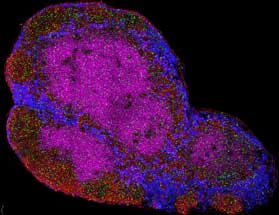
Cambridge Cancer Centre researchers based at the Medical Research Council (MRC) Cancer Unit have recently identified ways in which tumour-associated lymph nodes can change their behaviour following exposure to tumour-derived factors to exhibit features commonly associated with immune-suppression. The study which was led by Dr Jacqui Shields was recently published in Nature Immunology.
Lymph nodes (LNs) function as a major immunological hub, which are essential for immune regulation and the generation of the appropriate immune response. However, lymph nodes are also the first site of spread for many types of cancer (that are not adequately ‘cleared’ by the immune system).
It is becoming clear that LNs can generate a pro-tumour environment in response to tumour-derived signals, but how these responses are formed and what drives them is yet to be determined. The supporting stromal cell populations of lymph nodes are essential for their maintenance and physiological function. While studies have demonstrated the impact of tumour-derived factors on lymph node function (such as lymphangiogenesis), the contribution of stromal cells such as fibroblasts (fibroblastic reticular cells, FRCs) and the associated network they form has not been investigated.
This study is the first to demonstrate growth, structural remodelling and genetic (transcriptional) reprogramming of FRCS in tumour-draining lymph nodes (TDLNs) in response to tumour-derived factors even before tumour cells have spread. These alterations subsequently affected key immunological pathways, particularly decreases in guidance and survival cues, CCL21 and IL-7 respectively. This impacted not only the immune populations found within the LNs, but also their trafficking and localization once there. Combined, these have the potential to contribute to impaired function within these lymph nodes, promoting an immune-suppressive, pro-tumour environment.
“These findings demonstrate that tumours have to capacity to remotely modify TDLNs through aberrant stromal signalling, which affects their structure and function” says Dr Jacqui Shields, lead author on this study. “This study significantly enhances our understanding of the mechanisms whereby tumour-associated lymph nodes support a failed anti-tumour immune response and ultimately tumour progression. We hope to take this forward to determine if stromal remodelling can be predictive of metastasis in patients who have not yet presented with secondary disease”
This work was supported by the UK Medical Research Council.
The image above reveals a tumour draining lymph node showing T cells (magenta), B cells (red) and collagen networks of the stroma (blue). Proliferating cells are labelled in green.
Reference: Riedel A, Shorthouse D, Haas L, Hall BA, Shields J. Tumor-induced stromal reprogramming drives lymph node transformation. Nat Immunol. 2016 Jul 11. doi: 10.1038/ni.3492. [Epub ahead of print]















